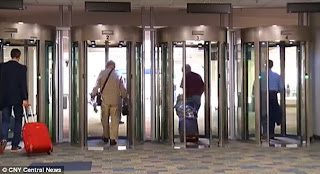Leaving Syracuse
I left Syracuse in May of 1987 as flurries fell. I missed my own graduation I was so anxious
to cross the country and start my post-college life (and escape the never ending
snow). I have not returned to my alma
matter nor to the city which seems fortuitous since to enter the city via the
airport you now need TSA authorization. According
to both NBC News
and the Daily Mail
passengers can’t leave the arrival area at Syracuse airport without approval
from the TSA. Passengers must now enter
a pod and wait for the TSA to electronically authorize them to leave the
terminal – from which they can’t return.
Way back in the last century when I would go from Boston to
Syracuse I flew the nascent airline People’s Express
before Continental ate them up only to later merge with United. The flight attendants would come up and down the aisle
collecting payment and all the fares were fixed and flat. (Bit of trivia: They were also the first airline to charge
for checking a bag: $3 and snacks cost
you $0.50.) It was the predecessor to
Southwest and so many other discount airlines.
Of course in those days you went right up to the gate without having to
undress, justify your travel plans to a government official or have your
possessions searched for the privilege of going from point A to point B in your own country.
Now it seem the old days are 2013 when TSA agents would
staff the exit areas by the gates to insure that passengers don’t turn around
after crossing a particular point (arbitrarily chosen by some committee
somewhere no doubt). How many of these agents
have we all seen dozing off, reading books, talking to other agents? I didn’t realize they were the last line of
defense in the U.S. security protocol against terrorism. Now very expensive looking pods will require
each passenger to step in, and then a robotic voice will authorize their
departure or direct them to be detained.
The TSA claims that this will save costs for staff and improve security. Likely it won’t save time for passengers and
will make flying even more festive than it is today.
I’ve done some search engine looking to see what security
breaches have occurred with passengers turning around at the end of the gate
area and causing mayhem, harm and threats of terrorist activity. While Bing and Google aren’t the most
definitive way to identify all cases that fall in that definition, it is
noteworthy that the bots couldn’t find one.
So it’s unclear what the agents, and now the pods are protecting
against.
TSA agents are paid
between $17,083 per year and $24,977. (The
more senior you are the wages can go up to $120,326.) The
pods at Syracuse’s Hancock Airport were installed as part of a $60 million
upgrade – the actual pod cost wasn’t identified – but suffice to say each pod
likely cost more than the cost of paying $75K per year (3 shifts of agents per day).
Earlier this month (Nov 2013) the Government Accountability Office completed its
investigation
into the $1 billion (with a b) TSA program to observe and talk with passengers
as a deterrent to terrorism. The report
said the results were “no better than chance.”
Put another way: the TSA could have flipped coins and gotten the same impact as the
billion dollars it spent on the program.
I’m comforted by the TSA’s sudden concern for thrift.
Cost-effectiveness doesn’t appear to be a priority for the
TSA when the full body scanners that showed people naked were abandoned back in 2007. Now those units are being sold at $0.10 on the dollar to prisons. The money the TSA is suddenly concerned about
saving is all pass-through dollars anyway – fees and taxes charged specifically
to cover security costs have increased the cost of air travel for every ticket,
every leg since 9/11. Doubtful that those fees will be reduced with all this cost savings going on.
Electronic devices have now been authorized
by the TSA. The freedom to use a Kindle was hard
fought and took many years. What will it take to restore the
freedom to leave the airport without proving your innocence? (Or to at least get enough people outraged about being literally held prisoner by the government.)




Comments
Post a Comment